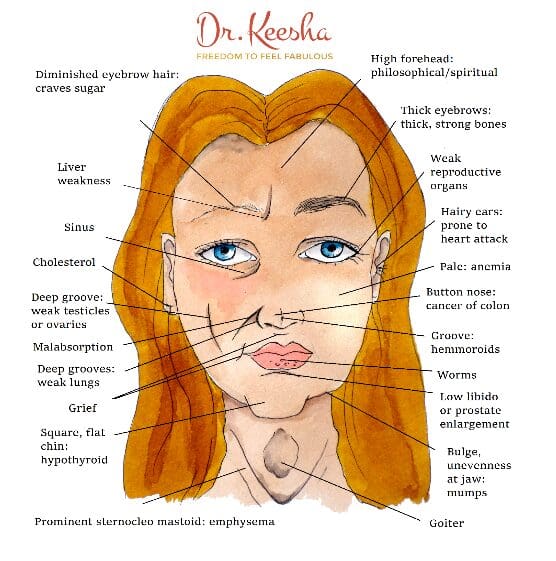Ayurveda is the 5,000-year- old sister science of yoga. Translated literally, the word Ayurveda means “science of life.” Thousands of years ago, the ancient sages, or rishis, of India knew we were not all the same person. In fact, they created an exquisite framework for determining our physical, mental, emotional and spiritual uniqueness. These constitutional types, or doshas, are known as vata, pitta and kapha. We are all born with our own unique mix of these three doshas. When they are out of balance, it will show up on your skin, in your body, and through the amount of energy you have.
This article is about the lines on your face and how to read them. I will call it Ayurvedic face mapping. By reading your own map you can see where you have been and where you are going in terms of your health, your mood, and your emotions. You might believe that wrinkles and lines on your face are just the random byproduct of aging. This is simply not true. You have earned each and every facial character line and blemish you have today. Would you like to slow down your earnings in the face line department?
Let’s take a journey through your life. The illustration below indicates some common lines and wrinkles. Here’s how to interpret them according to Ayurveda.

Dark circles or bags under the eyes: Weak kidneys, tired adrenal glands, food allergies that lead to sinus congestion. If you have “always” had dark circles under your eyes, check for food sensitivities and your adrenal health.
Horizontal forehead lines: You might be eating too much sugar or sugar and the wrong kinds of fats together. They also indicate a tendency to worry excessively.
Horizontal line at the top of nose: Low libido and/or allergies. It’s known as “the allergic salute” in children.
Vertical line between eyebrows: The right line is an “angry liver” and the life line can mean a weak spleen.
Laugh lines: These are a great by product of a lifetime of joviality. They can also signal diabetes or pancreatic distress.
Crow’s feet: These outer eye lines can be caused by squinting due to poor eyesight or a lifetime in the sun. They can also mean weak reproductive organs.
Deep chin groove: This can be from grief or frustration, but also from a love of sexual intimacy but low sexual desire.
Red-tipped nose: Heart weakness and circulatory issues.
Lines at top of lip: These happen when you purse your lips often, as in smoking. They are also an indicator of no sex for a good long while.
Lip spots: Worms or parasites in the colon and/or constipation.
Line at side of mouth: This can be from grief, which can lead to hormone imbalance due to the prolonged adrenal stress.
Double chin: Weak thyroid and/or extra weight.
The areas your facial lines are concentrated in also indicate something about your emotional well-being. For example:
Forehead lines: Fear, anxiety and worry.
Nose and cheeks: Jealousy, frustration and anger.
Chin and mouth: Depression, attachment issues, and grief.
This is a very simple taste of the wisdom Ayurveda can bring to the art of listening to your body’s feedback. Your facial lines, fingernails, hair, skin, bowel movements, energy level, mood, sleep quality, libido level, and tongue all have something to tell you if you know how to listen. It is not necessary to get all the way to a state of disease before correcting your imbalances. Your skin is illustrating your health story. Now you can read it!
Remember, this is not medical advice. It’s a map for you to use for yourself only. For more information about reading the feedback from your body, Ayurveda, functional medicine and reversing autoimmune disease, please visit Dr. Keesha Ewers at www.DrKeesha.com. Dr. Keesha is also the founder and director of the Academy for Integrative Medicine. If you are interested in becoming a certified integrative medicine health coach visit www.DrKeesha.com.
Here’s to your health!

Copyright ©2016 Dr. Keesha Ewers. No part of this article may be copied or distributed without permission from the author.
Just listened to your interview with Dr Cates – v interesting.
But cannot find the Ayurvedic Types Quiz on your website?